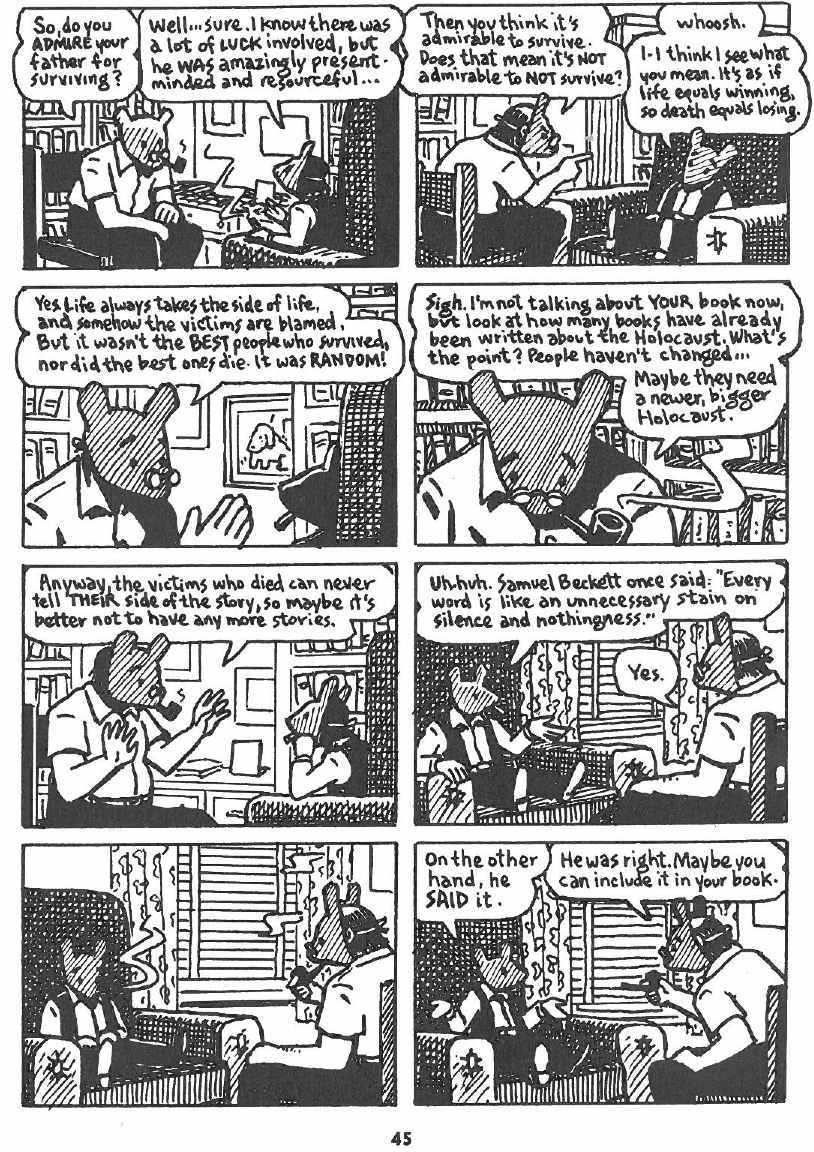What makes Maus deeply emotional and effective is not just the horrifying stories of the Holocaust, but how the Holocaust affected the survivor's lives afterwards and how it changed them as people. Many, many stories have been told of the atrocities of the Holocaust, but a very few speak about how the Holocaust affected the individual survivor's lives after the events. Art Spiegelman makes a purposeful effort not to just tell his father's story of the past events during the Holocaust, but what happened before and after. I think that is what was absolutely critical in what made this graphic novel such a success because it filled a gap in the story of that tragedy and gives the audience something to grasp that is more relatable. Some of the most emotional moments in the book for me were whenever Vladek talked about his wife, Anja. There is a scene where Art is talking about something totally different, but Vladek thinks he is talking about Anja and say he sees her all the time everywhere, even out of his glass eye. His strained relationship with Mala, his new wife, is clearly due to him constantly comparing her to Anja who she could never live up to in his mind. It's absolutely heartbreaking that even though they both lived through the events of Auschwitz, the Holocaust never really ended for either of them, especially Anja. The Holocaust still killed Anja even though she wasn't physically in Poland anymore, her mind was still there. Vladek also clearly still lives in that mindset, picking up wires, keeping strong even in his old age, and making sure nothing goes to waste.
Reading a bit about the reception of the work I discovered that some people found the portrayal of Vladek as very negative and criticized Art Spiegelman for showing his father in this light. I found the complete opposite and in fact at times felt that Art was being very ungrateful towards his father. Even though Art is having Vladek pull back up memories that he clearly wanted to bury, as demonstrated by burning all of Anya's diaries, he still happily does it and never complains. Vladek may have some high-strung tendencies, but he clearly loves his son deeply. Art is the only real family Vladek has left in the whole world and he survived a lot to be able to have him and spend time with him. He often remarks to Art that he is happy to spend time with him and loves when he comes over. In return, the only thing Art really wants from his father is his story to tell. Art doesn't want to talk about his father's troubles or problems and really at times it feels like he is using him. When his father tells him that he burned Anya's diaries he isn't at all sympathetic towards why he did it, only upset that his father's actions are thwarting his story. Even after hearing all that his father has been through and is witnessing what he is still struggling with he does not want to spend more time with his father when he most needs it. If anything, I think that Art himself was depicted negatively, but really the fact that even his flaws show through proves that he was just being honest and objective. Vladek is a bit annoying at times and has flaws, but all people do. He didn't portray him negatively, he just portrayed him honestly. Just because he lived through the Holocaust doesn't make him any less human. He isn't a saint. He is just a person.
